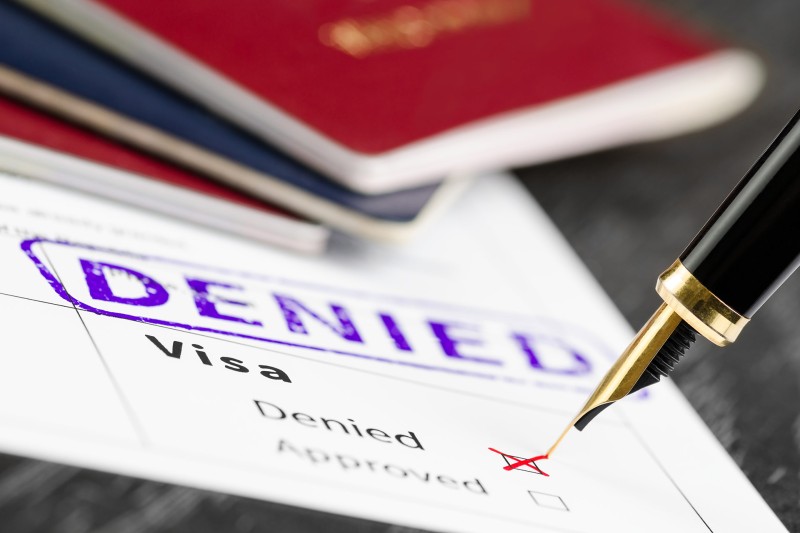In Ukraine, a folk ensemble danced under the windows of an embassy to prove they should get visas so they could participate in a cultural festival.
In Russia, Serbia, and other countries throughout the region, people with criminal pasts or a willingness to circumvent rules don’t dance and, in fact, rarely even go to the embassies. They avoid the endless lines that ordinary people in Eastern Europe endure, and they are not faced with countless requests for one more document, an endeavor that sometimes results in rejection for travel.
In today’s globalized society, most ordinary people face bureaucratic obstacles to getting work visas, passports and residency papers. Most shrug off the lines, the interviews and the hassle as a necessary part of a system that is designed to protect national interests, to regulate labor resources and to create barriers to criminals and terrorists.
Yet, those barriers often are nonexistent for those with criminal pasts or those who are willing to exploit weaknesses in the system—if they have enough money.
Journalists from the Organized Crime and Corruption Reporting Project (OCCRP) in several countries decided to examine the situation in their region, what support and “assistance” offers are available concerning border-crossing practices, and what the prices are for this assistance. The OCCRP research demonstrates that nearly everything is possible in this boundless market, for anyone with money.
Even honorary consul status, which sometimes can be seen as holding a diplomatic passport, is for sale in some countries.
Here are the two faces of migration that the reporters found: In the case of the Ukrainian dance troupe, they wanted several days’ visas as guests, and, in the end, were rejected and the rejection was stamped in passports, the black stamp.
Yet Russian businessmen with criminal connections have managed to become citizens of Greece and Germany and have crossed the EU border easily, buying villas at the seaside, yachts and prestigious cars.
Rules Can be Bent or Broken
The rules, then, can be bent or circumvented.
Even for those without influence, there is help, although they must be willing to break the law and pay the price. In the countries of Eastern Europe and in Russia there is a massive, well developed business offering “assistance” in getting necessary documents to travel. Such businesses advertise themselves through the internet, in newspapers and simply through hand-lettered sheets of paper with telephone numbers, plastered on utility poles along the streets.
This is how it works: There are plenty of offers, starting with promises of “assistance” with tourist or business visas and finishing with the “real help” to get second citizenship and even an honorary consulate. Forged visas and passports are readily available in Moscow and elsewhere.
Do the authorities know about those sales pitches? Sometimes their relatives are involved. In Macedonia, when the owner of a tourist agency was arrested for taking money and then not delivering promised visas, she turned out to be the wife of a former Macedonian minister of justice.
Money and connections are the keys to a back door in the border-crossing process, helping people avoid restrictions and tough regulations and giving easy access. It doesn’t seem to matter in some cases whether the person is a criminal leader or a terrorist.
Dzindic Killer Had Forged Passport
In Serbia, a former special forces commander, known as Legija, whose name is Milorad Ulemek or Milorad Lukovic, has been sentenced to four maximum terms of imprisonment for arranging the murder of prime-minister Zoran Dzindic and with helping a local criminal gang set up a number of terrorist attacks and kidnappings. When he was arrested, in his possession was a forged Croatian passport. Before 2001, he traveled with a diplomatic passport from the government of Slobodan Milosevic. According to police, criminal clan leaders who had been friendly to the former commander had diplomatic passports, too.
The recently published 2009 Organized Crime Threat Assessment from Europol reported that Eastern Europe, including former Soviet Union republics and the Western Balkans, are sources of illegal immigration, which is facilitated by “inconsistent immigration laws and national anomalies in the Schengen visa policy.” Europol, in that assessment, reported that “counterfeit documents…[touch] upon all criminal markets. Identity documents, passports, birth certificates, and residence permits are among the most commonly targeted documents ensuring smooth perpetration of cross border organized crime”.
The shadow business that makes such offers aggressively protects itself. In July 2009, a Slovenian diplomat was threatened after he had warned his government that organized crime figures from the Balkans were establishing fictitious companies in Slovenia, getting work permits and residence in the European Union through papers involving those companies.
The offers to help obtain Schengen status range from $70,000 to $1 million. The honorary consul status can bring diplomatic immunity and business advantages. For instance, it can carry the exclusive right to import or export certain goods and a diminishment of taxes during importation or exportation proceedings. Wealth is not usually enough to get honorary consul status. Connections are needed as well. In Russia, at least three of Prime Minister Vladimir Putin’s friends’ names have that status. In Serbia, a slots-club owner is an honorary consul.
Radovan Karadzic, an ultranationalist who was the first president of Bosnian Serbs and was their leader in the 1992-1995 war, is now at The Hague as a war criminal; he was arrested with a passport that identified him as a peasant he had never met. When the new, biometric passports were issued, they were supposed to be the latest in preventing passport fraud, but one lawyer in Macedonia said the skills to crack their codes are already in evidence among young hackers who tamper with credit card codes.
Bulgaria has become so alarmed by the use of fraud in obtaining travel and business documents that it announced a crackdown on such practices. As one of the officials suggested, the best way to force the system into honesty is to eliminate all intermediaries, who arrange for red tape to disappear and for necessary documents to materialize.
Problems Continue Country to Country
In Macedonia, visa assistance is offered for citizens to travel to virtually every country, with prices varying depending on which country the person wants to visit and for what purpose. The same practice is available in nearly every Eastern European country.
Moldova police, pressed a few years ago by the US to cut down the number of fraudulent passports that had been widely used in human trafficking, have seen a decline in the number of assistance companies, although some still exist. An inquiry at one of those companies was met by assurances that a passport and identification would be enough to procure a visa, which usually requires an invitation letter, a hotel reservation, information about the applicant’s job and salary, copies of work records books and, sometimes, university certificates and health insurance policy. A company spokesperson, asked how that could happen, said it was the company’s problem, but to solve it, the company must work through Ukraine, so the prices for assistance are higher.
Russian websites offer passports, visas and various other travel and business papers, along with credit cards and debit cards. The invitation letter from a European company that would be needed to acquire a business visa can be purchased in an office 300 meters from the Kremlin. Other offers advertise citizenship in Russia and Russian passports for international travels in days to months, a process that those selling them assure anyone who inquires that they can be speeded up. According to the Federal Migration Service, in Russia alone there is a $10 billion market in offers to “speed up” the process of getting passport for international travels. The Migration Service recently declared it would start a state enterprise to issue passports rapidly and squeeze the criminals out, putting its bureaucracy in charge.
--Reports from Russia, Ukraine, Serbia, Bosnia and Herzegovina, Moldova, Bulgaria, Macedonia, Romania.


